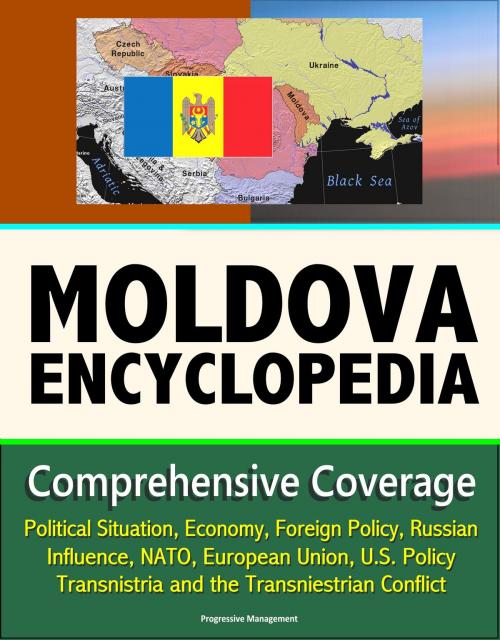Moldova Encyclopedia: Comprehensive Coverage - Political Situation, Economy, Foreign Policy, Russian Influence, NATO, European Union, U.S. Policy, Transnistria and the Transniestrian Conflict
Nonfiction, History, Eastern Europe| Author: | Progressive Management | ISBN: | 9781310532054 |
| Publisher: | Progressive Management | Publication: | April 6, 2014 |
| Imprint: | Smashwords Edition | Language: | English |
| Author: | Progressive Management |
| ISBN: | 9781310532054 |
| Publisher: | Progressive Management |
| Publication: | April 6, 2014 |
| Imprint: | Smashwords Edition |
| Language: | English |
Discover every aspect of Moldova and the breakaway "Dniestr Republic" now known as Transnistria in this massive, authoritative compilation of up-to-date official documents with details about everything from history and geography to the current political and military situation. Thirty parts total nearly one thousand pages of informative coverage, with extensive unique material!
Contents include: Moldova: Background and U.S. Policy * Moldova: Basic Facts * State Department Material * CIA Factbook: Moldova * Doing Business in Moldova: 2013 Country Commercial Guide for U.S. Companies * Moldova 2013 Human Rights Report * Moldova 2010 Human Rights Report * Foreign Operations Assistance Fact Sheet, June 2013 * Military Transformation Challenges: Moldova and Montenegro * Integrating Civil-Military Relations into the Professional Military Education Curriculum within the Republic of Moldova's Military Institute Issue Paper * The Republic of Moldova Military Institute's Lecture Series: Leadership and Ethics * The 2012 CSO Sustainability Index for Central and Eastern Europe and Eurasia - Moldova * Department of Labor's Bureau of International Labor Affairs - Moldova * US AID Moldova * Moldova Democracy and Governance Assessment * Moldova Anti-Corruption Assessment Final Report * Trafficking in Persons Report 2013 - Moldova (Tier 2) * Transportation, Distribution and Warehousing Services in Moldova * The Mineral Industry of Moldova * Customs Clearance Process in Moldova * Financial Crimes Enforcement Network Advisory * Republic of Moldova and the Transnistrian Conflict: The Impact of NATO and the European Union Enlargements on the Dispute Resolution Process * Moldova and Transnistria Reintegration Study * Evolution of Transdniestrian Conflict in the Republic of Moldova: Prospects for its Solution * The State of Play in Russia's Near Abroad * Transnistria: The "Hot" Nature of a "Frozen" Conflict * Some Lessons from Moldovian History and the New Chance, the New Challenges, Mistakes, and Useful Experiences * Moldavian Crisis Response: A Strategic Concept for Effective Inter-Ministerial Operations * Belarus and Moldova Country Studies * Transnistria: Prospects for a Solution.
Although a small country, Moldova has been of interest to U.S. policymakers due to its position between NATO and EU member Romania and strategic Ukraine. In addition, some experts have expressed concern about Russian efforts to extend its hegemony over Moldova through various methods, including a troop presence, manipulation of Moldova's relationship with its breakaway Transnistria region, and energy supplies and other economic links. Moldova's political and economic weakness has made it a source of organized criminal activity of concern to U.S. policymakers, including trafficking in persons.
From 2009 until March 2013, Moldova was governed by the Alliance for European Integration, a coalition of center-right parties. The government claimed to be focused on dismantling the country's Communist legacy and building a state ruled by law. However, conflicts with the Communist opposition and tensions within the coalition have slowed reform efforts. The accidental killing of a businessman in December 2012 and an attempted cover-up by the Prosecutor General touched off open conflict among the AEI parties, and the government collapsed in March. A new government comprising most of the members of the old AEI was approved by parliament at the end of May.
Moldova is Europe's poorest country, according to the World Bank. Remittances from Moldovans working abroad amounted to 22% of the country's Gross Domestic Product in 2010. The global financial crisis has had a negative impact on Moldova. Moldova's currency weakened and remittances dropped, as Moldovan emigrants lost jobs in other hard-hit countries. Moldova's GDP dropped by 7.3% in 2009, rebounded by 6.9% in 2010 and 6.5% in 2011, only to drop by 0.8% in 2012, due to the Eurozone crisis.
Discover every aspect of Moldova and the breakaway "Dniestr Republic" now known as Transnistria in this massive, authoritative compilation of up-to-date official documents with details about everything from history and geography to the current political and military situation. Thirty parts total nearly one thousand pages of informative coverage, with extensive unique material!
Contents include: Moldova: Background and U.S. Policy * Moldova: Basic Facts * State Department Material * CIA Factbook: Moldova * Doing Business in Moldova: 2013 Country Commercial Guide for U.S. Companies * Moldova 2013 Human Rights Report * Moldova 2010 Human Rights Report * Foreign Operations Assistance Fact Sheet, June 2013 * Military Transformation Challenges: Moldova and Montenegro * Integrating Civil-Military Relations into the Professional Military Education Curriculum within the Republic of Moldova's Military Institute Issue Paper * The Republic of Moldova Military Institute's Lecture Series: Leadership and Ethics * The 2012 CSO Sustainability Index for Central and Eastern Europe and Eurasia - Moldova * Department of Labor's Bureau of International Labor Affairs - Moldova * US AID Moldova * Moldova Democracy and Governance Assessment * Moldova Anti-Corruption Assessment Final Report * Trafficking in Persons Report 2013 - Moldova (Tier 2) * Transportation, Distribution and Warehousing Services in Moldova * The Mineral Industry of Moldova * Customs Clearance Process in Moldova * Financial Crimes Enforcement Network Advisory * Republic of Moldova and the Transnistrian Conflict: The Impact of NATO and the European Union Enlargements on the Dispute Resolution Process * Moldova and Transnistria Reintegration Study * Evolution of Transdniestrian Conflict in the Republic of Moldova: Prospects for its Solution * The State of Play in Russia's Near Abroad * Transnistria: The "Hot" Nature of a "Frozen" Conflict * Some Lessons from Moldovian History and the New Chance, the New Challenges, Mistakes, and Useful Experiences * Moldavian Crisis Response: A Strategic Concept for Effective Inter-Ministerial Operations * Belarus and Moldova Country Studies * Transnistria: Prospects for a Solution.
Although a small country, Moldova has been of interest to U.S. policymakers due to its position between NATO and EU member Romania and strategic Ukraine. In addition, some experts have expressed concern about Russian efforts to extend its hegemony over Moldova through various methods, including a troop presence, manipulation of Moldova's relationship with its breakaway Transnistria region, and energy supplies and other economic links. Moldova's political and economic weakness has made it a source of organized criminal activity of concern to U.S. policymakers, including trafficking in persons.
From 2009 until March 2013, Moldova was governed by the Alliance for European Integration, a coalition of center-right parties. The government claimed to be focused on dismantling the country's Communist legacy and building a state ruled by law. However, conflicts with the Communist opposition and tensions within the coalition have slowed reform efforts. The accidental killing of a businessman in December 2012 and an attempted cover-up by the Prosecutor General touched off open conflict among the AEI parties, and the government collapsed in March. A new government comprising most of the members of the old AEI was approved by parliament at the end of May.
Moldova is Europe's poorest country, according to the World Bank. Remittances from Moldovans working abroad amounted to 22% of the country's Gross Domestic Product in 2010. The global financial crisis has had a negative impact on Moldova. Moldova's currency weakened and remittances dropped, as Moldovan emigrants lost jobs in other hard-hit countries. Moldova's GDP dropped by 7.3% in 2009, rebounded by 6.9% in 2010 and 6.5% in 2011, only to drop by 0.8% in 2012, due to the Eurozone crisis.















